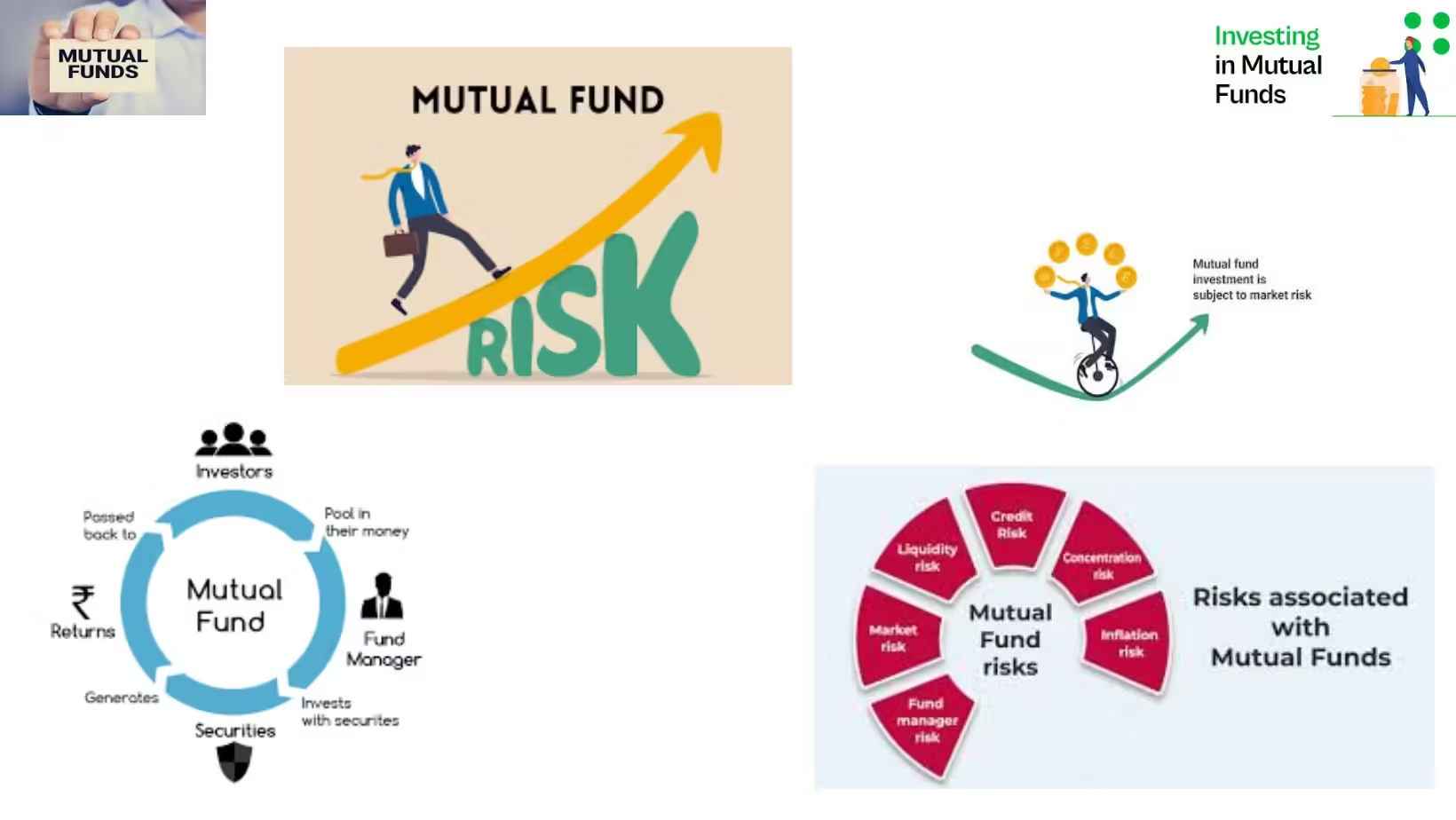Are there any risks in mutual funds?
Most people have the desire to invest into mutual funds. But, there is a sense of dread. There is a worry that the funds could be sunk. Therefore, first be aware that it’s real that there are dangers associated with making investments in mutual fund however, if they’re known at the beginning, making investments in mutual funds could be done with good results.
The investment in mutual funds can yield excellent returns, however proper understanding is vital. Therefore, let us learn today the dangers associated with the investment in mutual fund, and how you can make the most out of it..
Mutual Funds Risk -Overview
Mutual funds can be a good method to stay away from market volatility and to invest with confidence in the market. However, it’s not as if when you invest in a mutual fund you’ll reap the benefits. The way in which many mutual funds is lower than the market’s moderate structure. So, certain precautions must be taken prior to making a decision to invest in mutual funds. One of the most important things to keep in mind include the fact that Mutual Funds are long-term investments. Don’t anticipate huge return in just a one or two years. Even if you put in only a little, you should keep it for an extended duration. Regularly invest in schemes like SIPs.
When is the best time to invest into Mutual funds?
It is possible to invest in mutual funds However, you should wait until certain steps are taken. In the first place you should give priority to our health and lifestyle. This means, you should take an insurance plan for the term and health insurance. Following this, you should be able to have an emergency fund in case of the event of an emergency.
If you meet the above requirements then you are able to begin making investments in mutual funds immediately If it’s not the case, first you must meet the requirements. Mutual funds can be advantageous only after a considerable period of time. If you are in this situation should you require cash at this point, you’ll first take money from your mutual fund. So, the best option is to set up emergencies and health insurance prior to making investments in mutual funds.
Risk Involved in Mutual Funds
Below are the different kinds of risk that mutual funds, as investment vehicles carry-
1. Systematic Risk
Systematic risks are those which you can’t eliminate. Although they cannot be ruled out however, they can be controlled by utilizing the correct Asset Allocation. Asset Allocation is essentially creating an investment portfolio that includes multiple assets.

#SIP
#financialgoals
Today’s investment in SIP can become tomorrow’s reliable income source. By consistently contributing to SIPs, you can build a substantial investment corpus that generates steady returns, supporting your financial needs in the future.
Referral Link:
2. Unsystematic Risk
Unsystematic Risk Also known as diversifiable risk/residual Risk is the Risk that is unique to a particular industry or company. Unsystematic Risk is minimized through diversification that of a portfolio investment. Here are the risks involved when you invest into Mutual Funds-
- Market Risks This is probably the most typical risk associated with any investment strategy. The risk of market is possibility of the economy or economy will suffer which causes individuals to lose value regardless of the performance.
- Absorption Risks: Generally Absorption is the act of focusing on a single thing, i.e., a significant portion of an individual’s investments in a single plan is not a wise decision. Profits could be very high If you are lucky, however the losses are more. Concentrating and investing heavily in a single sector can be extremely risky.
- Risks to Interest Rates: Interest rate risk is a part of bond mutual funds. It is concerned with the possibility of rising interest rates and their impact on the price of bonds. The well-known inverted relationship between bond prices and interest rates play an important role in this. In the event of rising interest rates, bond prices to drop which reduces capital gains.
- Inflation Risks: The risk of inflation is the possibility of losing your purchasing power. In simple terms, if your mutual funds are earning 5% annually and your cost of living rises by two percent, you’ll be left with just the equivalent of 3% in net earnings from your investment. This is referred to as the true rates of returns.
I am a certified financial expert on Mutual Funds, NPS, and Fixed Deposits. By tailoring a portfolio to your specific needs, my goal is to put you on the path to financial well being. Connect with me to know more about how you can better manage your finances
www.assetplus.in/mfd/ARN-301757
- Liquidity Risks: A liquidity risks refer to the issue of repurchasing an investment without causing an increase in the value of the investment. It also can occur when a seller is unable to find a buyer to purchase security. For mutual funds, for instance, ELSS, the lock-in period could cause liquidity risk. This is due to the fact that there is nothing that can be accomplished during the lock-in duration. In a different scenario, Exchange-traded Funds might suffer from the risk of losing liquidity. As you are likely to know that ETFs can be purchased and sold through exchanges for stocks, just like shares. Sometimes, because of an absence of buyers on markets, it is possible that you may not be able to sell your ETFs when you require them most.
- Credit Risks: The term “credit risk” is when the issuer of a scheme can’t pay what it was stated as interest. If a bond issuer is unable to pay back the bond, it could be considered an investment of no value. When it comes to mutual funds credit categories are directly affected by credit risk since the fund manager may invest in assets with less credit ratings in order to earn greater returns.
- Uncontrollable forces While mutual funds provide the ease in investing their money, they can’t know the precise nature of a fund’s portfolio, nor are they able to directly determine which securities the fund manager is able to purchase. The fund could be diverse enough, however the investor cannot influence the actions taken by the fund’s manager.
- Risks for a nation: risk arises from changes in the economic system of the foreign country in which the fund is invested. Specific legislative changes and economic volatility in the country could impact the return of the fund. This risk is most affecting foreign funds.
Wrapping Up
We can conclude that investing in mutual funds could be extremely risky. It is always recommended to think about your financial situation, age and how much growth you would like to see in the near future. It can help you determine your risk-taking capacity. Investors who are risk-averse put their money into Equity Mutual Funds, while those who don’t want to be risky, are able to invest in Balanced Mutual Funds, including Debt and Equity.


















